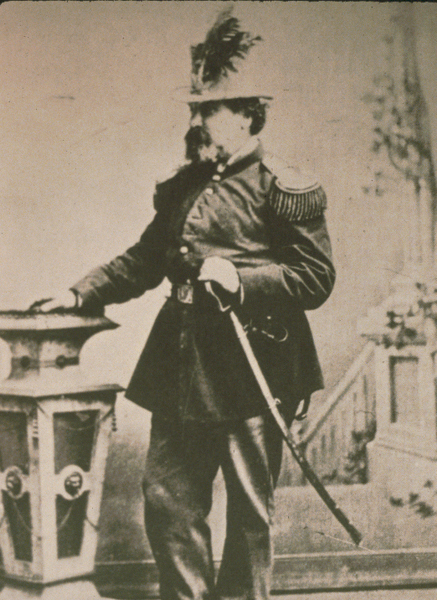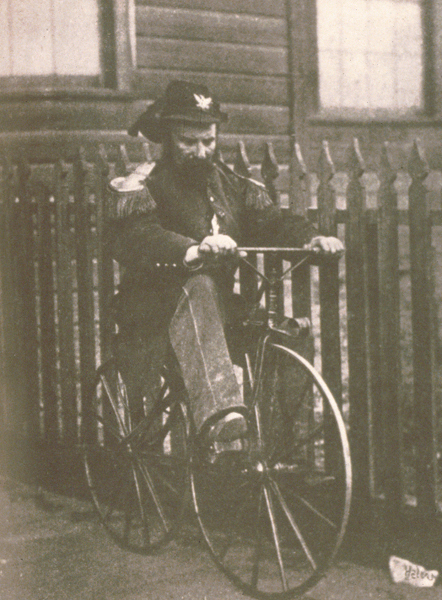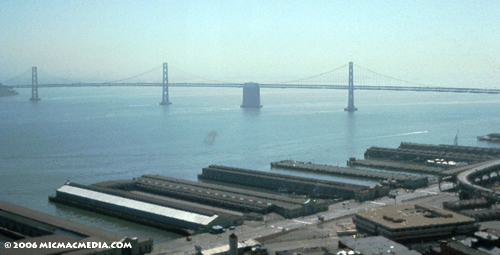|
Tahoe Nugget #67:
Joshua A. Norton: First Emperor of the United States (3 Photos)
April 25, 2006
Ever since the Gold Rush, California has been known as a society replete with oddballs and eccentrics. None fit the bill better than Joshua Abraham Norton, self-proclaimed First Emperor of the United States and
Protector of Mexico.
Norton was not your typical Forty Niner. He was one of the few who arrived with money in his wallet. Born as a commoner in London, England, 1819, he immigrated with his family to South
Africa where Joshua was educated and then practiced in business. In 1849, after his parents and his only brother died, Norton sailed for San Francisco with a $40,000 inheritance to invest in California's booming
gold rush economy. He set up successful real estate and brokerage businesses which by 1853 had blossomed into assets worth a quarter of a million dollars.
But Norton was not content with his new-found
wealth; he wanted more. Foreseeing a large demand for rice from the many Oriental workers in the city, he bought as much of it as he could in an attempt to corner the local market. The price soared, but before he
could cash in on the product's upgraded value, two cargo ships loaded with rice steamed into San Francisco Bay. The inflated market immediately collapsed and Norton lost everything he owned overnight.
After
his financial crash, the shattered businessman mysteriously vanished for several months. He reappeared in San Francisco not as a bankrupt merchant, but as Norton the First, Emperor of the United States. Clad in an
old blue military uniform, complete with gold braid, brass buttons, and epaulets, Norton publicly announced his rule with a proclamation which was published on the front page of the San Francisco Bulletin on September 17, 1859.
Norton was pestered and teased by some, but instead of sending him to an insane asylum, the community graciously adopted the eccentric ex-merchant as the town mascot. When passing him in the street his subjects invariably saluted, bowed, or in some other respectful manner acknowledged their "Emperor." A tireless walker, Norton patrolled the city streets every day, making certain that all sidewalks were clear of obstructions, roadwork was proceeding correctly and that the police were properly on duty. With a ceremonial sword at his side and umbrella or walking stick as his scepter, the amiable bearded monarch strolled about his domain inspecting buildings under construction and ensuring that all of the city's codes and ordinances were enforced. On Sundays he could be seen in the churches, and he never missed a concert, festival or public parade.
Throughout his "reign," Emperor Norton issued proclamations and edicts. He hated the nickname "Frisco" for his adopted hometown and published a decree stating, "Whoever after due and proper warning shall be heard to utter the abdominal word 'Frisco,' which has no linguistic or other warrant, shall be deemed guilty of a High Misdemeanor." The penalty for non-compliance was $25.
As Norton's fame spread, businessmen and merchants actually offered him the tribute and royal treatment he commanded. He ate in the fanciest restaurants as the guest of the owners, and never paid for theater tickets or entry into other places of amusement. On his excursions to dinner or theater, the emperor was usually accompanied by two opportunistic canines, Bummer and Lazarus, who wisely followed Norton for the food scraps which were always forthcoming. Norton never begged for money; instead he would visit a local banker or merchant and demand it. He rarely asked for more than two or three dollars, but occasionally he might collect $10 from a businessman with a sense of humor.
Norton rarely missed a session of the California Legislature convening in Sacramento and frequently took his seat in the front row where he followed the delegate's arguments with undivided attention. Emperor Norton was even allowed to issue bonds and cash his own scrip; these bogus financial instruments were elaborately designed and printed free of charge by local printers and honored by businesses and banks around town.
When Norton died suddenly of apoplexy [stroke] while standing on the corner of California Street and Grant Avenue on January 8, 1880, the city mourned his death as they would a monarch. Flags flew at half mast, businesses closed, and more than ten thousand people attended his elaborate funeral, after which the Emperor was buried in the Masonic cemetery with all the ceremony that real royalty would have received.
Norton may have suffered from an "unbalanced mind," but in the decades after his death, many of his prescient ideas found fruition in reality. Despite his slovenly appearance and ludicrous dignity, during his "reign" Norton anticipated and proffered practical solutions for many future events. Among his sound and sober economic and political prognostications was using landfill to expand San Francisco into the Bay; construction of the "impossible" Golden Gate Bridge (its correct location and technical feasibility utilizing innovative cable suspension); the evils of the dominant Democratic and Republican politics of dissension (abolish both of the parties); and he called for a League of Nations to settle international disputes (United Nations).
In 1872 Norton ordered a suspension bridge be built from Oakland to San Francisco. More than 60 years later, the "Bay Bridge" was opened in 1936, described by President Herbert Hoover as "the greatest bridge every erected by the human race." In December 2004, San Francisco's Board of Supervisors approved a resolution to officially change the name of the Bay Bridge to Norton I Bridge. Last I heard, the resolution was making its way through the California Legislature.
For more than a quarter of a century, Emperor Norton I "ruled" San Francisco with a gentle and benevolent hand. He once was taken into police custody for lunacy, but officials later released him with the simple statement, "He has shed no blood, robbed no one, and despoiled no country." The residents of San Francisco grew to love the eccentric man who exhibited such sincere concern for his subjects, and they made him their one and only "free" citizen, an amicable ambassador for, and recipient of, generosity and good will.
One 19th century resident of San Francisco hit the nail on the head when he wrote, "In no other city in the world, and at no other time than during the after glow of the generous 'days of gold,' would this quaint ruler have been accorded so magnanimous a consideration and respect."
Photo #1: Emperor Joshua Norton dressed in full military uniform.
Photo #2: Norton, a 19th century San Francisco eccentric, often rode his bicycle around the city.
Photo #3: Bay Bridge, to be renamed Norton I Bridge if S.F. Board of Supervisors get their way.
Photo by John F. McLaughlin, 1975



|





